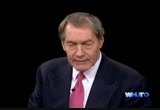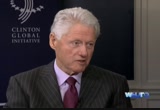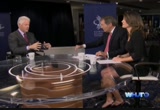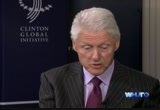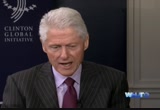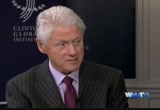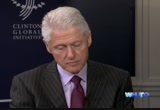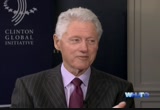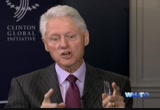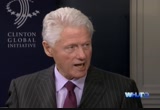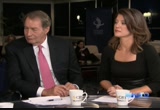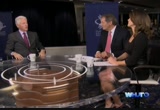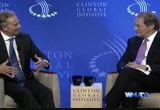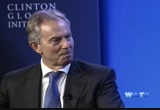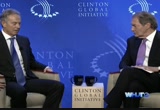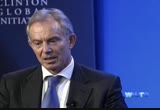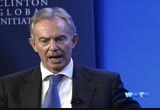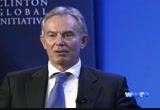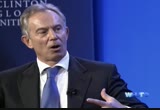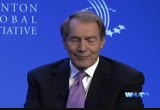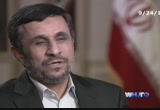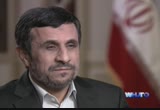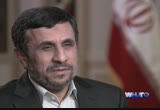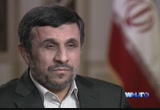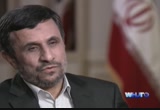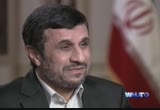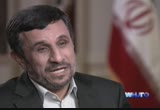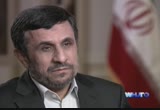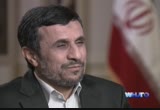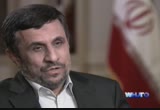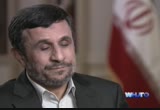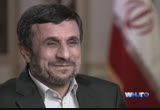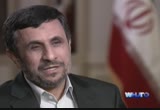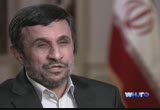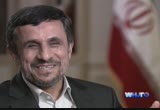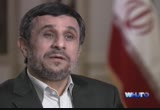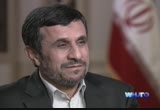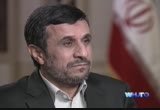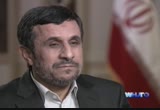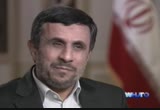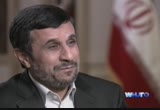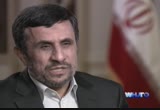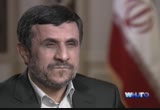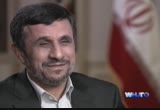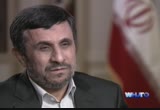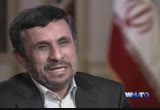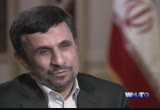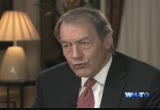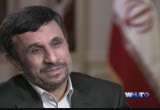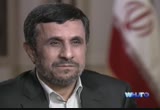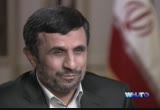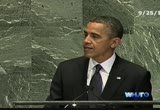tv Charlie Rose WHUT October 2, 2012 3:00am-4:00am EDT
3:00 am
>> rose: welcome to the program. tonight more conversations from the u.n. general assembly and the clinton global initiative. we begin with president clinton. >> we continue with former prime minister tony blair. >> and we conclude with the president of iran, mahmoud ahmadinejad. three perspectives on the middle east, the arab spring and iran when we continue. funding for charlie rose was provided by the following: captioning sponsored by
3:01 am
3:02 am
major global conferences, one the united nations general assembly in which representatives of the nations who are members of the general assembly come here, including heads of state and foreign ministers and others at the clinton global initiative, business and government and ngo s were in attendance to talk about big ideas, big problems. one of the problems they talked about at both places was syria. another was middle east protest about a film that attacked mohammed and the third was iran and nuclear weapons. we begin with the former president of the united states bill clinton in conversation with me and my colleague at cbs nora o'donnell. >> rose: do you think this election the president has said that change has to come from outside rather than in washington, that this election has the possibility of producing a change that will be able to overcome gridlock. >> i don't think it to the only has the possibility, i
3:03 am
think it almost certainly will. and let me explain why. i think the president's going to win but let's assume governor romney won. if he wins, that almost certainly means the republicans will hold on to the house and it will be about 50/50 in the senate, more or less the way it is now. you can't filibuster a budget. it's the only thing that doesn't require 60 votes in the senate to pass o as opposed to 51. so a lot of the policymaking will be pushed into the budget and he'll just have to pick up one or two people on that. if you assume that he is going to do what he said he's going to do, i think a lot of his priorities will be enacted. and i think it will be bad on the budget side, as i said. including for medicare t will drive the medicare trust fund out-- dry up the money by 2016. if what i think is going to happen happens and president obama wins, i think that too
3:04 am
will break the logjam for a different reason. as senator mcconnell says their number one goal for the last four years has been denying him a second term. as soon as he gets that, they can't deny him a third term. he can't have one anyway. so i think you will see, i will just make a prediction. i think in the lame duck session they will avoid the fiscal cliff, they will reach an agreement-- . >> rose: by extending it, by some kind of an extension or by making a deal. >> they'll either make a deal or they will have a short extension which makes it clear this is not another year, i predict that you will get a budget deal early next year f not in this lame duck session. and i think you'll see them start to work together. it is going to be a different world. >> rose: because the election will have that kind of consequence. >> absolutely. >> one of romney's top foreign policy advisors said the other day that obama has made the united states look impo nent the world. dot facts bear that out. >> i disagree with that.
3:05 am
i disagree with that. the suggestion that somehow america could or even should be in the drivers seat in the arab spring is inherently ridiculous. i mean what happened in egypt was done by the people, the young people, primarily, in tahrir square. then the egypt that was left having lost its autocratic superstructure was still an egypt, just look at the distribution of the population, most likely to produce an islamist government, with which it did. all along the way we should try to maximize our values and our interests, including freedom and human rights, and not just majority rule but minority rights, and individual rights. but we couldn't control it, and we shouldn't. and i expect that's what president morsi will say here tomorrow. but if you look at libya, we had more opportunities to
3:06 am
influence it, and we did. and we influenced it in a very positive way. and they like us more than a lot of people do in the middle east. but notwithstanding that, and the fact that libya died trying to protect him, we lost an ambassador this and other americans, because other people didn't. >> rose: take syria as an example, should we be doing more in syria? >> well, if the world were or at least we had some sort of alliance, i suppose you could try to have some sort of no-fly zone but the pilots would be very much in risk in that because of the capacity the syrians have on the ground to shoot down airplanes. so this is, syria is a really difficult proposition. and it's a complex to society. when mr. assad goes as i believe eventually he will, what takes its place. how do we do that? these are complicated things. i don't know enough about-- when
3:07 am
every one of these things is going on, gi out of my way not to talk to hillary about it so i don't have any information i shouldn't have so i don't inadvertently say something to you that i shouldn't say. so i don't know what their options are. but i think that if we have some nonlethal options that we could use to support the syrian opposition, i presume we would be doing it. and i wouldn't be surprised if we are. i think most people believe that assad is going to have to go. it's sooner or later he will. and their concern about whether-- whatever arrangements that succeeds him can preserve a secular state can preserve a state which gives women a commendable amount of opportunities when compared with the competition in the region, you know, and but is less oppressive, less repressive and less subject
3:08 am
to the siren song of the iranians and hezbollah and other forces that promote terror in the region. >> rose: president morsi is coming to cga and also to the united nations or in reverse order. he said we need to understand the arab world better than we do, their values and their different. what is it that you think he ought to understand about america? >> well, he lives here. >> rose: he did, southern california. >> he lived in southern california. and he basically decided he liked america, he liked the economic system. he liked a lot of the people he met. but he thought that we were culturally too crass, that women were object find, tha that-- objectified. that-- and you know, that he-- he supported the muslim culture of being less-- he
3:09 am
thought we were too overtly sexual a society and all of that. and there is something to his argument there. but what he should know or should make sure his fellow egyptians know about america is that this rioting which he-- he has spoken out against, against this movie trailer, is premised on the fact that there's no division between church and state. we had to know about this movie being made, we had to know-- which was never made by the way, it had to be done by somebody's sanctions, and if it wasn't we would prove it by putting everybody associated with it in jail, open and shut, over and out. what he should make sure the egyptians should know about us is the reason muslims can worship in the united states in a freeway, with the broad support of the vast majority of the american people and
3:10 am
the reason jews can do the same thing, and the reason we have the highest percentage of church-going attendance of any predominantly christian nation in the world, and the reason we welcome buddhists and hindus and bahaies and people of all other faiths is that our government is separated from the practice of faith but protects the right of everyone to practice, to talk about it, to not believe, and to say whatever they want. and that it works for us, and it's made us an extraordinarily, religiously observant country. so we weren't disrespecting islam by not squelching a film trailer that nobody in authority knew anything about, that 99% of us think was crude and disrespectful and awful, but that we have learned the hard way over more than 200 years, that in
3:11 am
order to preserve freedom and liberty, including the freedom of religion, you have to allow people to say and do things that you find abhor ant. and you can't react every time you are insulted. i means that's the first thing we all have to teach our children. and i don't mean to compare the people rioting against news cairo and anywhere else to children, that's not the point. the point is if you live in a shame-based society where you think nothing good is going to happen, the temptation is to wait for somebody to say something you find offensive and you can lash out against it. but free people, mandela, absorb destructive things and refuse to be destroyed. there's a child here, i mean not a child, a young woman, i don't know if you have seen here. the disabled chinese lady, you have seen her, right. >> rose: yes. >> i went to her village, i was in her home, in 1998 as
3:12 am
president. its with a great honor, right, not for her. her parents were required to take her upstairs and hide her, leave her on the bed upstairs because they live in a culture that thought there was something wrong with disabilities. and that young girl waited until this spring when i had the cgiu to meet me for the first time. i was in her home. now what did she do? she decided not to be a victim. she decided to become an advocate for women, an advocate for the disabled. she married a five man who now carries her around. she made the most of her life. that is what we've got to deal with. yet, americans don't understand all muslim countries as well as we should. but they need to understand us and themselves. you cannot live in a shame-based world. you won't make it in the 21st century.
3:13 am
there is too much diversity. there's too much stuff going on on the internet. you've got to be able to say, if you believe in islam, that i believe in a god and a prophet, strong enough to withstand the criticisms of petty, narrow-minded, mean-spirited people. i believe that the cultural crassness i an here will in the end fall before the values that i exalt. we've got to liberate people. we can't keep, you know, all of us being as predictable as a doorbell. punches-- punch us and you get the response you know. that's what i want them to know about america. that we're not perfect in that but we're trying to be that. >> rose: it's good have you here. >> president clinton, thank you very much. >> thank you. >> rose: we continue at the clinton global initiative with the former prime minister of great britain,
3:14 am
tony blair. what were you thinking about with respect to the protests that have taken place both in libya and in egypt and other places. >> i mean if anyone is actually watched a little bit of it as i did because i was due to comment on it, so i thought i should actually watch a part of it. and it is offensive, it's meant to be offensive. it's also a pretty bad fees of filmmaking, not that i'm an expert but even i could tell that. however, the fact is the reaction to it is, you know, is also completely wrong. and over the top and absurd. so you've got to ask yourself how can such a thing produce such a reaction. and look, what i think and you saw this very clearly in libya is that all over the middle east today and actually beyond it, you see these two elements really in struggle with each other. and you saw this very
3:15 am
clearly in libya. there were the extremists who killed chris stevens, an appalling murder of somebody who had actually done his best for the libyan people. but then you then have thousands on the street protesting against his killers and demanding action be taken. so i think the more i look at the world today, i think in a way a more relevant struggle to a lot of countries than what i would call traditional left versus right politics is the open minded versus the closed minded. and the open minded see globalizations as an opportunity. they want an open society, an open economy, a society where you tolerate and respect people, a different faiths and cultures and then the closed minded who really have a view that if you don't accept my view then are you an alien or an enemy. i think that is the battle that is going on and in the end, i think it's important always, and i always say this to people in america to realize-- realize that for all the pictures of
3:16 am
extremist that you see in people burning the american flag and protesting and so on, you also then have a lot of people who wanted same type of society and free society that we want. >> rose: has the is palestinian-israeli situation gotten off the front burner for too long and you can bring it back? >> well, it's a good question. not for the people out in the region, by the way. >> rose: it has not gotten off the front burner. >> no, i still believe that it's central to the future of the region. look, i have just come back from my last-- it was my 88th visit there. my wife said to me it is not actually the number of visits you made, it's the progress that counts. which i didn't think was remarkably supportive, actually. but-- . >> rose: this is a qualit quality-quantity argument, isn't it. >> yeah. so look, there is a risk, i think. there's a risk in the region and there is a risk in america, people say look you have the arab revolution, the uprising, the palestinian thing takes second place. this is a big mistake in my
3:17 am
view. i think the palestinian issue is still absolutely fundamental to understanding the region to resolving some of the underlying tensions of it. >> well, you achieved some success in ireland. why can't you achieve some success between israelis an palestinians. got. >> well, actually, there is one, sometimes people say to me, what is the most difficult. >> i say the most frustrating aspect is that actually for this conflict, the israeli-palestinian conflict, the one way it should be in principles easier to resolve, in the irish situation there is still an unresolved question about the end game. united island versus united kingdom. that's still unresolved. we still don't know what the answer is to that. and yet we managed to bring peace. with this situation, you know, we do say that we know the solution. which is two states, the
3:18 am
secure state of israel, state of palestine. yet we can't seem to get there. now i think personally, we can get there. but i think we are over this next period it is maybe more difficult once you have everything happening, including here. but i think-- . >> rose: you mean the elections. >> yeah. it's-- you know, it would be odd if we were able to take a major new initiative right at this moment. however, i do think that it is possible to put together a credible negotiation, provided alongside that negotiation, and this is my sort of fixation having dealt with this now for a few years, you've got also to make the changes on the ground that support the political process. so if you carry on in a situation where the facts on the ground are working against a political solution t will never work. so i believe it is possible to do this. and i think it remains absolutely urgent. >> i assume are you talking about settlements on one
3:19 am
side as a fact on the ground and what on the other side. >> there is the question of settlement where settlement expansion makes it hard for the palestinian state to be viable, that is a major problem, of course, but it's also issues to do with security. and that's not just about the west bank where there has been major improvements in security but gaza where since the beginning of this year, 500 rockets have come out, 500 israeli civilians. you know, it's a big challenge but it can be done. one of the things i often say to people out there is when i first started dealing with the northern ireland process, people said to me when i first came to power, this is hopeless. people have been troying for decades and never got anywhere. and if you take that attitude, then you give up. but you can't give up. >> rose: when you look at syria today, what can we do, people outside of syria, in at rab world and the western world to somehow bring an end to the violence? >> fantastically difficult, this. because here is the problem that the west faces in these issues.
3:20 am
and you really learn this in part from the experience of going through afghanistan, of iraq and now with the arab uprisings, so on. it's that when you lift the lid of oppression off these countries, then, and this is where this differs, i think fundamentally from say the collapse of the berlin wall and eastern europe and western democracy. when you take the lid of repression off these countries which is right to do, you then find a whole lot of forces that were suppressed by that oppression come out. religious, ethnic, tribal and so on. and so the worry people have about syria, i mean i think we can be very blunt about this is okay, what assad is doing is entirely unacceptable. but what happens when he goes? who takes over? who are these people? what motivates them? and now personally i think we have got to try and shape the opposition and do what we can to hasten assad's depar ture.
3:21 am
i believe that myself. but that is the problem western leaders have, and i have sat in the seat and faced these situations so i know how difficult it is, it likely-- particularly in the light of experience, what then happens. so you know, all over the middle east at the moment you've got regimes and countries in a process of transition. but the thing with revolutions is you know how they begin but you never quite know where they end. and that's the problem people have. >> rose: thank you very much. tony blair, former prime minister of great britain. we conclude this evening with the president of iran, mahmoud ahmadinejad. the conversation with my colleague at cbs norah o'donnell took place at his hotel. there are many things we have to talk about. but i would like to blin with a place in which there-- begin with a place in which there is killing, a place in which you have an interest, and a place in which you can play a positive role, that's syria.
3:22 am
what are you prepared to do to end the fighting and work out some kind of dialogue with a number of parties? >> in the name of god, its almighty, the merciful, the beneficient, first of all i would like your permission to say hello to everyone watching this program. and i would like to ask the almighty god for health and success for everyone. i am very happy to be talking with you again. and also with the lady. you brought up a good topic. syria right now has a very complicated situation. and there are many factors, in that there are many factors in conflict in syria. some people sell weapons,
3:23 am
some encourage-- some dictate who should come who should go, who should stay. our viewpoint about syria and our position is perfectly clear. we are of the belief that what should happen in syria is the right of the syrian people. and all peoples have the right to take advantage of freedom and success. now what's in store for the future of syria depends on the people of syria. what we are doing, what we would like to do is to help the parties approach each other and begin a dialogue and bring about a national agreement to decide for the future. i would like also to add that rather than being so worried about syria's today, we are more worried about syria tomorrow.
3:24 am
when tribal conflict will deepen, it will-- it will bring lack of security there for the coming decade. and that is to the disadvantage that will make the whole region suffer. therefore, whomever is concerned for syria, whomever is concerned for the people of syria should try to stop the fighting. secondly, a national dialogue should take place. they should decide with agreement on what to do. this is what we're following. and now we are trying to establish a conflict group, a four party group. we are expanding this group. i am personally-- i have personally spoke when certain presidents and ministers and we are trying to expand the work of this group in a better fashion.
3:25 am
>> rose: if i may, i assume that includes turkey? i assume it includes saudi arabia, who else? >> there are many countries that can be-- that can help. the countries that are part of the nonallied movement, countries that are members of the islamic conference, they can be helpful. so far i have spoke when pakistan, with bangladesh, with india, with malaysia and i do believe indonesia and ghana and venezuela will be added to the list as well. >> rose: let me ask you this, many people believe and there is some evidence, they say, that you're supplying arms to the government in syria that allows them to continue killing their own people. >> i think that the government of syria doesn't have any problem pros curing arms. and they don't need us for
3:26 am
that. >> rose: but are you doing it? >> they have closer associates that can supply them with every kind of weapon. >> rose: but are you supplying them with weapons. >> no. >> you say are you not interfering but iran is interfering by all accounts. you say you want a dialogue but yet you continue to send arms and money, manpower to bash ar assad's forces, while he's killing his own people. are you complicity in that? >> i have answered the question. after all, anyone can accuse anyone. on the international scene, especially in syria. we can accuse you, you can accuse us. >> i'm not accusing-- i'm not accusing anyone, it's the commander in chief of its islamic revolution major al jabbari has admitted that the-- assisted training 50,000 soldiers for bash ar assad's government. is that not true?
3:27 am
>> this has been a-- this has been officially denied 50,000-- i don't think 50,000 people, 50,000 forces would even fit in syria. >> so you are not assisting, are you not assisting at all, you have no involvement at? >> certainly. both parties are our friends. they are both people of syria. we love both parties. can with not not love them. there are religious connections, cultural connections and emotional connections. however there are some regional conflicts, there are some regional conflicts that have interfered with-- with syria. and we are trying to lessen those interferences. we like-- iran has no
3:28 am
advantage in lack of security in the area. no advantage whatsoever. >> rose: your best friend in the region has been the assad government in syria. so if he goes, it's a loss for iran. >> you see, we are friends with every country in the region. especially we have recently found some new friends that you know about. iran is a very vast and powerful country. rather than just be worried about syria's current situation, we are worried about their future. the syrian society is a tribal one. no tribe, no tribe can gain power by war. because-- because with war, you start an endless war. one tribe gains power through war, and that will lead to other tribes starting the war. and that is very dangerous for a reason.
3:29 am
this fire can quickly spread to turkey to jordan, to iraq. it is very dangerous. >> rose: may i ask this question, turning to another issue that is of great concern to the world, which is the success of negotiations between your government and the p-5 plus 1. where are you and do you believe there will be some success? >> we are hopeful that this will happen. this is why we are participating in the talks, in the negotiations. if there is no hope for success, then why would we even participate. however, we think that with technical and legal negotiations, we will not achieve anything. because our nuclear issue is not, is not legal and is not
3:30 am
technical. you know about it because we have discussed it several times. >> rose: you believe it's a political question. >> yes t is clear t is clear that it's political. >> are you building a nuclear weapon? >> a nuclear weapon? for what, for what purpose, why would we do that? >> what would we use it for? >> you did not deny you are building a nuclear weapon. >> how many times should i repeat this opinions please, repeat it. please tell me what iran is doing. >> what we would do? what would we do? let's even imagine that we have anatomic weapon, a nuclear weapon with. what would we do with it? what intelligent person would fight 5,000 american bombs with one bomb. >> rose: mr. president, let's assume that the p 5 plus 1 negotiation does not work. let's assume that your willingness to go back to a relationship with turkey and brazil is no longer possible. and let's assume that the
3:31 am
israeli believe a red line has been passed, and the day cannot-- that they cannot afford to allow a country that has been-- has said what your government has said about them to possess nuclear weapons, and let's assume that they passed a red line and attack iran. what is your government prepared to do and how will you do it? >> well, there are several issues here that need to be addressed. the first is that after all, iran is a big country, a vast country and is perfectly capable of defending itself. iran will defend itself. our hands are not tied. iran can defend itself. the second issue is, by principles, we do not mix
3:32 am
the zyonists in our political considerations, in our political equation. and the third is that after all, the zionist regime is threatening iran. why is there silence in the world in this regard? the same international community that the lady mentioned, why are they-- why are they sitting silent in respect to threats against an autonomous country that is a member of that community. why should they not condemn it? please allow me to tell you the fourth point. why should the zionist regime establish a red line for the united states government's policy with iran. who are these people. please, someone tell me who these people are. >> rose: it's not the issue they are establishing for the united states government, it's the issue they may have for themselves. and why do you continue and every conversation to refer to them as a zionist regime
3:33 am
rather than the state of israel? >> well, not you personally but does the united states government, would they accept iran establishing a red line for the zionist regime. >> rose: meaning -- >> there would be yelling and screaming and that would just fill the world. so what does that mean? one country should establish a red line for another country? what does that mean? i don't understand this. >> rose: one thing it means is that israel believes, because of the things that you have said about them, that you want to destroy them. that if you have nuclear weapons, they believe that you might either use them or they will fall into the hands of someone else. that is the fear they have because of the rhetoric and the tone of your comments about them. >> any one can-- anyone decide about other fates
3:34 am
just based on their own opinion. there have been-- there has been even stronger language traded between the united states and iran. the iranians have said repeatedly-- the americans have said repeatedly, the americans have repeatedly said that the iranian government must change. and iranians-- . >> rose: change its behavior, change its behavior. >> sure, but after all, what does that mean. they have said that a radical change must come about. and the iranians demonstrate against the americans. well, these slogans are very harsh. see, after all, we need to accept some kind of rule throughout the world that is even for everyone. can one country based on just their own sole opinion decide and establish a red line for another country and then threaten attacks? when have we threatened to attack the zionists, we have
3:35 am
never threatened them. >> rose: you said you want to wipe them from the face of the earth. >> yes, let me explain. i have explained several times but let me explain. we say that occupation, occupation should be done away with, war like behavior should be done away with, terrorism should be done away with. the killing of women and children should be done away with. the bombardment of houses on top of people's heads in their own countries must be done away with. has the zionist regime done anything other than this during the last 65 years, no, they haven't. well, we say to do away with these things. and we have also suggested the solution. we have said that the solution is that the palestinian people should-- should decide in a free election for their own country, for their own land. you think if-- do you think that if the people of palestine freely decide, what would happen? it's the same thing that we
3:36 am
say. we don't have any quarrels over just words. we have a quarrel over the content. >> rose: it's not just israel it is not just the united states. it's russia, it's china, it's some of your friends have all said they do not want iran to have either a nuclear capacity or nuclear weapons. and that's the same argument that the state of israel makes. >> people must gather in other places and solve this problem. whenever the united states government decides to change its behavior toward iran, it will be resolved immediately. and it's interesting that the zionist regime has more than 250,000 a-- atomic warheads, nuclear warheads and they have threatened us repeatedly. >> rose: but they have never used any nuclear weapons. >> and we never say that we were worried. during the 65 years, they
3:37 am
have initiated, the zionist regime has initiated five wars. we have not initiated a single war. five wars that were purpose traded by the zionists. which war did we start? >> rose: if there is an attack by the israelis, would you consider that-- would you retaliate against the united states if there is an attack by israel? >> well, by the principles of it, i don't take the zionist threat serious. >> rose: they're bluffing. >> i done even take them-- we don't even take them into account. i would like to ask you this question. after all, the zionist regime, who is, under whose influence who is sub serviant to whom, the zionist to the united states government or the united states government to the zionist, which one is which. >> for a country you say you don't take into account, you sure spend a lot of time talking about them, including today here in new york. you said that israel has no historical roots in the middle east. and the white house has now
3:38 am
called that statement by you disgusting, offensive, and outrage us. would you like to apologize? >> do they have roots? if they have roots then just say they have roots. we don't have to fight over it. we say they have no roots. and you say they do. we give you reason, so please give us a reason. back it up by facts. what should i apologize for. this is a technical and scientific fact, statement. we say they don't have it for these reasons. you say they have it, okay, please state the reasons. and nations will listen and choose accordingly. >> rose: i want to -- >> this fight. i would like to ask you this question. what is the relationship between the united states government and the zionist regime. can you please explain that to me? is it a relationship between two autonomous countries? then why is it that the head
3:39 am
of the zionist regime comes out and says the u.s. government should do this, should do that. >> rose: mr. president -- >> what is the zionist's regime's role in the united states. what is it really? we are a country in the middle -- middle east. and we have at least a 7,000 year history. the zionists threaten us. the united states government instead of condemning them, condemn us. after all, what is this relationship about, this relationship between the zionist regime. could someone explain this relationship between the zionist regime and the united states government. is this an equal relation, is this a friendly relationship. is this a relationship of two associates. who calls the shots, the united states government or the zionist government? o so that we can ascertain all these behaviors.
3:40 am
>> mr. president, these are easy answers. they are an ally, they are a friend. one is not subservient to the other. as in most relationships. whatever mr. netanyahu said about a red line, the united states government didn't even respond about that, as you know. so it's-- the president has made clear what the relationship is. and every other president has made clear what the relationship is. let me, the point here is how do you end this issue that is so troubling to so many people? how do you convince them that what you say is true? and eliminate this tension so that there's no misperception about anybody, so that you're not saying they're bluffing. how do you get past this? >> so we're the ones that should alleviate the misunderstanding, the zionist regime is threatening us so we are the ones that should alleviate
3:41 am
the misunderstanding? >> you see the problem that i have with the administrators of the united states is right here. please listen, please. any one that is watching this interview. our problem is not with the zionist regime. our issues is with the-- in the world that allows one regime in the world to threaten another country and no one says anything about it. not that this threat really matters to us, no. just the fact, just the fact that they pose, that they threaten and other people not only say nothing but encourage that, this kind of order is not sustainable. if they-- if you want to get to the root of today's problems in the world t comes back to this sort of order. it's a double standard. it's a single-sided, it's unilateral and a single sided kind of order.
3:42 am
it is very bad. we would expect there to be corrected. we would expect the united states government to take the first step in rectifying this. >> let's turn to the issue of the international sanctions against iran. they have been unprecedented sanctions. the cost of living in iran has skyrocketed. we've seen pictures of protests in the streets of iran over high chicken prices, other basic food, too expensive. how difficult have these sanctions been? >> after all, sanctions always bring about certain problems. but if someone thinks that with these sanctions that iran were crumbled because of these sanctions, they are sadly mistaken. the people that have imposed the sanctions should come in and visit iran. people are living their lives. after all, sure there are certain problems, but these problems are not something
3:43 am
that would-- our economy is very strong. >> oil expert-- oil exports have been cut dramatically. >> that's okay. our economy, our economy is an internal one it is dependent upon domestic production. about 10% at the most of our economy is dependent on foreign trade. it's not that all of the economy-- you see, the issue that i have is this. sometime, some people think that they own the world. they think that-- they think that the lives of the whole world is dependent upon them. they think that if they impose sanctions that people will die. it's not so. they are mistaken. iran is an advanced country. it's powerful. and it has an internal economy. we produce and we consume. >> so you say they have had no affect at all, these sanctions. your people are not hurting
3:44 am
at all. >> i didn't say that. i didn't say that. are you changing what i said. i said after all, there are problems that come along with sanctions. but if one thinks that these sanctions can cause iran to surrender, they are mistaken. >> robert leffinson who you know about and you have been asked about before, is anything that could happen a trade or something that would allow him to come back to the united states. >> well, last year i remember that iranian an american media groups, i remember that last year iranian and american intelligence groups had a meeting. but i haven't followed up on it. but i believe there have been contacts established between u.s. and iranian intelligence entities. now when i go back to iran i
3:45 am
can follow up on this. i'm not informed about the latest developments. i thought they had come to some kind of an agreement. >> rose: to do what? >> i thought that-- i thought that they had made some progress. there is why-- i haven't followed up on it since last year. >> rose: if the united states had been more vocal and supportive of those people who were in the streets after your election, what impact would that have had in iran? >> well, they did, they did provide the support. and we saw that that was the people of iran. i mean sure, some people came and demonstrated. an when these issues were addressed, the demonstrations were put to rest. afterwards people came and set fires and did such things. and that was the people of iran. >> rose: people were killed and there were a lot of
3:46 am
human rights issues raised. >> yes, yes. unfortunately, 32 or 33 people were killed. but that comprised police personnel and other people. and it would have been bet ferr the united states government had not gotten mixed up in this. and this is also one of the issues that bothers the people of iran. why should the u.s. government interfere. i wish they hadn't, we wish they hadn't interfered. why did they interfere. we had some great elections in iran. >> rose: do you believe that the relationship between the united states and iran is better now than it was at the beginning of the obama administration in 2000-- 2008/2009? >> i have said i don't want to talk about something that would affect-- that would
3:47 am
affect the u.s. elections. but i can state my own desires. i think, i think that the current situation between iran and the u.s. is to both parties disadvantage. there is certainly much room for improvement. why should the u.s. government be in conflict with us i haven't really been able to understand this so far. and i'm a political person. has the united states government have any gains, i'm not saying we have had any gains. no, we certainly didn't have any gains. why should we be in conflict with each other this is a serious question. >> rose: it's a very serious question. >> after all the american politicians should sit down and answer this question. why should we disagree with one another. >> rose: and i will ask them but what about your side? what can you do, what are you prepared to do, what changes have you made in terms of your attitude about the united states.
3:48 am
your willingness to meet them halfway? >> you personally, you personally know that i have taken some big steps. and i'm to the going to repeat them. but i think that many good things can be done, many good things. one of them is this nuclear issue. iran's nuclear issue has gotten tire some. it's become a point of contention. and no one ask looking at it logically. we should put this to rest. it would help a lot. we can-- we can cooperate in regional matters. now there is lack of security in the region. and it's against everyone's interests, in afghanistan n pakistan. we should cooperate to alleviate this lack of security. this is all doable.
3:49 am
right now in the persian gulf, there are more than 100 warships in a small gulf. why are they there? >> rose: in part because you threatened the strait of hormuz. >> we-- we have provided security for the strait of hormuz for 2 to 3,000 years. the persian gulf has always been safe and secure. look at history. the only time it's become unsafe and has no security has been when foreign-- when for enforces have interfered in local affairs. when saddal hussein started fighting against us t started becoming unsafe. we have always provided safety with the help of our neighbors for persian gulf. and we will continue to do so. what are those warships doing there? what advantage do they have? it is only an expense. i'm telling you, you
3:50 am
can't-- you can't, you can't defeat iran with warships. if someone thinks that they can defeat iran with war, it is obvious that they know nothing about politics. you can't defeat iran with war. there needs to be cooperation. >> rose: isn't it in your interest to convince everybody that you don't want to have enriched uranium that is larger than a certain percentage, you don't want to do things that suggest that you may have other interests. >> what should we do to satisfy the united states government at the end of the day, they will say change your behaviour. so what is it that we must do to finally convince them so this has no legal meaning. >> rose: last time i had a conversation with you here, a year ago, after the conversation in which you tried, and you talked in a reasonable way in part about things and expressed your concerns about america and about israel, you then went to the united flations and
3:51 am
made a highly inflammatory speech. will dow that again? >> who was it, without did i inflame? is it not a forum for everyone to speak freely, to speak sincerely. every year the united states of america's president comes there and speaksim of iran, to say the least. and i sit there. and we listen. and we show no reaction because it is, at least on the surface, a forum within which governments should be able to express themselves freely. we didn't threaten anyone. we didn't insult anyone. we just posed a few simple questions. we must accept at least that level of freedom throughout the world for everyone to speak their minds. >> rose: when you said, when you catch fish in a pond they're still fresh. when it gets to the table, what did that mean?
3:52 am
>> that means that it's never too late to rectify mistakes. that means it's never too late to gain from it. we should not continue on a path of repeated mistakes. whenever you stop a loss are you still profiting. even though it may seem to be a little too late in the game. 33 years ago the united states government made a mistake. it stood in front of and against the will of the people of iran. this mistake can still be rectified. let's not worry about this, no one will come in the world and say well the united states suffered a loss here. it was defeated. it can be done, why should a mistake be continued and be propagated? this is what i mean. it is a percent saying. so but keep in mind, i'm not saying that the iranian side has made no mistakes. would never say that. i don't contend that we are
3:53 am
mistake-free. we are a nation that battled against a dictatorship, a brutal dictatorship and gained their freedom. and we expected that the united states government would support the victorious side which is the people of iran. but we saw their behavior was quite contrary to that expectation. they can still rectify that mistake. >> rose: mr. president,. >> we never welcomed foreign couraged nor incite warfare and conflict. we love the people of the united states. you perhaps, sir, know this better than many. we love all people. we wish for paets and friendship to be everywhere. there must be relations between thetates, to allow an exchange of people there are millions of iranian-americans living here. and they are some of the most, amongst one of the most successful immigrant classes to the united states. so the world request no
3:54 am
longer be managed through conflict and warfare it can only be managed through friendship and love. and we are quite ready to help. >> rose: mr. president, on behalf of norah o'donnell and me, thank you. finally there is this. the president of the united states barack obama in a speech at the united nations talked about the same issues. >> it's been less than two years since a vendor in tunesia set himself on fire to protest the oppressive corruption in his country. and sparked with what became known as the arab spring. and since then the world has been captivated by the transformation that has taken place. and the united states has supported the forces of change. we have taken these positions because we believe that freedom and self-determination are not unique to one culture. these are not simply american values or western values.
3:55 am
they are uniform values. -- universal values. and even though there are huge challenges to come with the transition to democracy, i'm con finsed that-- convinced that ultimately government of the people, by the people and for the people is more likely to bring about the stability, prosperity and individual opportunity that serve as a basis for peace in our world. captioning sponsored by rose communications captioned by media access group at wgbh access.wgbh.org
3:56 am
119 Views
IN COLLECTIONS
WHUT (Howard University Television) Television Archive
Television Archive  Television Archive News Search Service
Television Archive News Search Service  The Chin Grimes TV News Archive
The Chin Grimes TV News Archive 
Uploaded by TV Archive on

 Live Music Archive
Live Music Archive Librivox Free Audio
Librivox Free Audio Metropolitan Museum
Metropolitan Museum Cleveland Museum of Art
Cleveland Museum of Art Internet Arcade
Internet Arcade Console Living Room
Console Living Room Books to Borrow
Books to Borrow Open Library
Open Library TV News
TV News Understanding 9/11
Understanding 9/11

